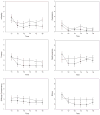The effects of acute exercise on tobacco cravings and withdrawal symptoms in temporary abstinent pregnant smokers
- PMID: 24290209
- PMCID: PMC3922712
- DOI: 10.1016/j.addbeh.2013.10.034
The effects of acute exercise on tobacco cravings and withdrawal symptoms in temporary abstinent pregnant smokers
Abstract
Introduction: Smoking during pregnancy is common, and quitting at any point during pregnancy can yield benefits to both the fetus and mother. Smoking cessation is typically followed by withdrawal symptoms and a strong desire to smoke, both of which are likely to contribute to relapse. Research has shown that a bout of exercise minimizes cravings and tobacco withdrawal symptoms (TWS) after temporary abstinence in smokers, but these findings have not been replicated in pregnant smokers. This study examined the effect of 20min of exercise on cravings (primary outcome) and TWS (secondary outcomes) among temporary abstinent, inactive pregnant smokers.
Methods: Thirty female smokers (Mean(M) age=25.7years, Standard Deviation(SD)=5.5; M weeks pregnant=18.2, SD=5.3; Fagerstrom Test for Cigarette Dependence=3.3, SD=2.2; M 9.3 cigarettes/day, SD=4.7; M hours abstained=17.2, SD=2.8) were randomized to 20 min of mild-to-moderate intensity exercise (EC; n=14) or passive (PC; n=16) condition. Cravings and TWS were assessed immediately before, during (at 10 min), immediately post, and at 10, 20, and 30 min post-condition.
Results: A 2 (condition)×6 (time) repeated measures ANOVA revealed that the EC significantly (p<0.05) reduced cravings (ή(2)=0.46) compared with the PC, across time. Non-significant, but nevertheless, large effects were evident favouring the EC over time for TWS restlessness (ή(2)=0.34), stress (ή(2)=0.24), irritability (ή(2)=0.21), tension (ή(2)=0.15), and depression (ή(2)=0.14).
Conclusions: Consistent with previous research, this study reveals that in pregnant smokers, a bout of exercise is associated with a reduction in cravings and similar patterns exist for TWS. Therefore, exercise may have the potential to assist in the initial stages of smoking cessation attempts during pregnancy.
Keywords: Cravings; Pregnancy; Smoking cessation; Withdrawal symptoms.
Crown Copyright © 2013. Published by Elsevier Ltd. All rights reserved.
Conflict of interest statement
My coauthors and I do not have any personal or financial conflicts of interest related to the research, nor do the authors have other relationships with other people or organizations within three years of beginning the submitted work that could inappropriately influence, or be perceived to influence, this work.
Figures


References
-
- Castles A, Adams EK, Melvin CL, Kelsch C, Boulton ML. Effects of smoking during pregnancy. Five meta-analyses. American Journal of Preventive Medicine. 1999;16:208–215. - PubMed
-
- Coleman T, Chamberlain C, Davey MA, Cooper SE, Leonardi-Bee J. Pharmacological interventions for promoting smoking cessation during pregnancy. Cochrane Database of Systematic Reviews. 2012:CD010078. http://dx.doi.org/10.1002/14651858. CD010078 (Issue 9. Art. No.) - DOI - PubMed
-
- CTUMS. Canadian Tobacco Use Monitoring Survey, Health Canada. 2011 Retrieved from http://www.hc-sc.gc.ca.
-
- Daniel JZ, Cropley M, Fife-Schaw C. Acute exercise effects on smoking withdrawal symptoms and desire to smoke are not related to expectation. Psychopharmacology. 2007;195:125–129. http://dx.doi.org/10.1007/s00213-007-0889-6. - DOI - PubMed
-
- Davenport MH, Mottola MF, McManus R, Gratton R. A walking intervention improves capillary glucose control in women with gestational diabetes mellitus: A pilot study. Applied Physiology, Nutrition and Metabolism. 2008;33(3):511–517. http://dx.doi.org/10.1139/H08-018. - DOI - PubMed
Publication types
MeSH terms
Substances
Grants and funding
LinkOut - more resources
Full Text Sources
Other Literature Sources
Medical

